初中英语近义词辨析大全
初中英语近义词、同义词、词组、短语辨析大全
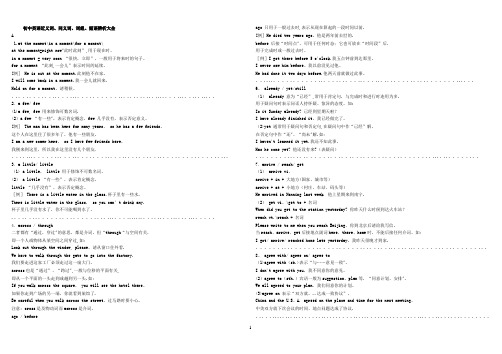
初中英语近义词、同义词、词组、短语辨析大全A1.at the moment\in a moment\for a moment\at the moment=right now"此时此刻”,用于现在时。
in a moment = very soon “很快,立即”,一般用于将来时的句子。
for a moment “此刻,一会儿”表示时间的延续。
[例] He is out at the moment.此刻他不在家。
I will come back in a moment.我一会儿就回来。
Hold on for a moment。
请稍候。
.。
.。
.。
..。
...。
.。
..。
.。
.。
.。
..。
....。
...。
..。
...。
.2.a few/ few(1)a few, few 用来修饰可数名词.(2)a few “有一些",表示肯定概念,few 几乎没有,表示否定意义。
[例] The man has been here for many years, so he has a few friends。
这个人在这里住了很多年了,他有一些朋友。
I am a new comer here, so I have few friends here。
我刚来到这里,所以我在这里没有几个朋友. 。
.。
...。
..。
..。
.。
..。
..。
.。
.。
..。
.。
.。
.。
..。
3.a little/ little(1) a little, little 用于修饰不可数名词。
(2) a little “有一些”,表示肯定概念。
little “几乎没有”,表示否定概念。
[例] There is a little water in the glass.杯子里有一些水.There is little water in the glass, so you can’t drink any.杯子里几乎没有水了,你不可能喝到水了。
初中中考英语100组近义词辨析

初中英语近义词辨析1. clothes, cloth, clothingclothes统指各种衣服,谓语动词永远是复数,cloth指布,为不可数名词clothing 服装的总称,指一件衣服用a piece of, an article of.2. family, house, homehome 家,包括住处和家人,house房子,住宅,family家庭成员. My family is a happy one.3. sound, voice, noisesound自然界各种各样的声音,voice人的嗓音,noise噪音I hate the loud noise outside.4. photo, picture, drawingphoto用照相机拍摄的照片,picture可指相片,图片,电影片,drawing画的画。
5. population, peoplepopulation人口,人数,people具体的人China has a large population.6. road, street, path, wayroad具体的公路,马路,street街道,path小路,小径,way道路,途径take this road; in the street, show me the way to the museum.7. custom, habitcustom传统风俗,习俗,也可指生活习惯,后接to do,habit生活习惯,习惯成自然,后接of doing. I've got the habit of drinking a lot.8. exercise, exercises, practiceexercise运动,锻炼(不可数),exercises练习(可数),practice(反复做的)练习Practice makes perfect.9. class, lesson作"课"解时,两者可以替换.指课文用lesson. 指班级或全体学生用class. Lesson 6; class 5.10. officer, officialofficer部队的军官,official政府官员an army officer.11. work, job二者均指工作。
初中英语 近义词辨析
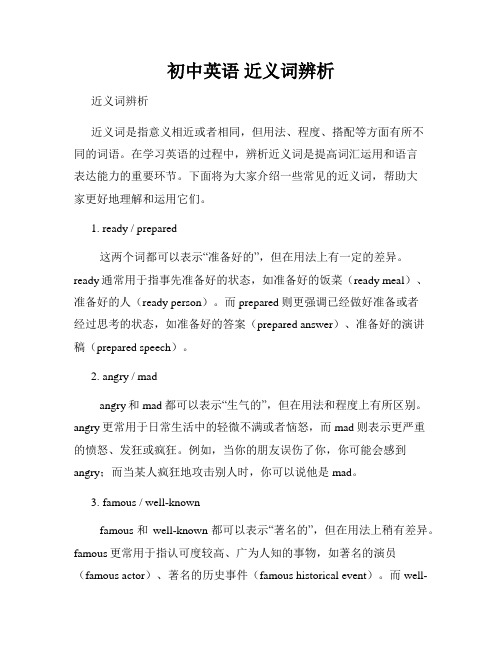
初中英语近义词辨析近义词辨析近义词是指意义相近或者相同,但用法、程度、搭配等方面有所不同的词语。
在学习英语的过程中,辨析近义词是提高词汇运用和语言表达能力的重要环节。
下面将为大家介绍一些常见的近义词,帮助大家更好地理解和运用它们。
1. ready / prepared这两个词都可以表示“准备好的”,但在用法上有一定的差异。
ready通常用于指事先准备好的状态,如准备好的饭菜(ready meal)、准备好的人(ready person)。
而prepared则更强调已经做好准备或者经过思考的状态,如准备好的答案(prepared answer)、准备好的演讲稿(prepared speech)。
2. angry / madangry和mad都可以表示“生气的”,但在用法和程度上有所区别。
angry更常用于日常生活中的轻微不满或者恼怒,而mad则表示更严重的愤怒、发狂或疯狂。
例如,当你的朋友误伤了你,你可能会感到angry;而当某人疯狂地攻击别人时,你可以说他是mad。
3. famous / well-knownfamous和well-known都可以表示“著名的”,但在用法上稍有差异。
famous更常用于指认可度较高、广为人知的事物,如著名的演员(famous actor)、著名的历史事件(famous historical event)。
而well-known则更侧重于广为人知、众所周知的事物,如众所周知的事实(well-known fact)、众所周知的地方(well-known place)。
4. continue / keepcontinue和keep都可以表示“继续”,但在用法上有所区别。
continue常用于指在某种情况下继续进行某个动作,如继续学习(continue studying)、继续工作(continue working)。
而keep则表示保持某种状态或持续进行某个动作,如保持安静(keep quiet)、持续成长(keep growing)。
初中英语同义词辨析

.初中英语同义词辨析初中英语同义词辨析目录:英语学习过程中经常遇到同义、近义词的辨析,这是英语学习的难点之一,也是中考考点之一,现在把自己整理的一些初中常见的同义近义词的辨析总结如下:1、talk tell speak say2、good well nice3、look see watch read 一、maybe, probably , perhaps二、few , a few , little , a little三、each , every 四、when , while 和as五、between, among 六、among , in the middle of七、Such , so 八、Nobody , no one , none九、idea, concept, conception, thought, notion, impression十、identify, recognize, make out “认出,识别十一、idle, lazy 闲散,懒惰十二、if, whether 十三、ignorant, illiterate无知的十四、ill, sick 十五、illness, sickness, disease, complaint十六、imagination, fancy, fantasy想象,幻想十七、immediately, instantly, presently, directly, shortly, soon, at once, right away十八、immerse, dip, duck, plunge, submerge沉浸,浸入十九、improve, better, perfect, refine改进,改善二十、indeed, really, truly, actually确实地,真正地二十一、indispensable, essential, necessary, requisite必不可少的,必需的二十二、induce, persuade, urge, convince, counsel, coax劝说,劝导,劝诱1. feel like:想要做某事,2. much too too much too many3. few a few. little a little 6. both , all放在be动词的后面7. enough 的用法:8.形容词修饰不定代词9形容词变副词;通常是在词尾加ly 10. used to do sth be used to doing sth 11. look for11\ find: find out 12. borrow lend:13. have ( has ) been to :have ( has ) gone to 14. nobody : 代词,“没人”,不能用于of 结构中。
英语常考近义词成语辨析100组

英语常考近义词成语辨析100组1. 喜欢 vs. 爱好 - 指对某一事物或活动的有好感或偏爱。
2. 开心 vs. 快乐 - 表示愉快的心情。
3. 困惑 vs. 迷惑 - 表示对某事情感到疑惑或莫名其妙。
4. 同情 vs. 同情心 - 表示对他人的困难或苦难感到理解和关切。
5. 感激 vs. 感谢 - 表示对别人的帮助或恩惠表示谢意。
6. 独特 vs. 特殊 - 表示与众不同或与常规不同。
7. 敏捷 vs. 灵活 - 表示动作或思维的迅捷程度。
8. 忠诚 vs. 诚实 - 表示对某人或某事的忠心和坦诚。
9. 本领 vs. 能力 - 表示某种技能或才能。
10. 合理 vs. 公正 - 表示合乎逻辑或公平正义。
11. 危险 vs. 风险 - 表示存在威胁或可能带来危险的情况。
12. 政府 vs. 政权 - 表示治理国家的机构或组织。
13. 友谊 vs. 友情 - 表示朋友之间的情感和关系。
14. 丰富 vs. 富裕 - 表示财富或资源充足。
15. 智慧 vs. 聪明 - 表示智力水平较高或思维敏捷。
16. 关注 vs. 关心 - 表示对某事物或某人的关注和关心。
17. 反对 vs. 抵制 - 表示不支持或反抗某一事物或行为。
18. 容易 vs. 简单 - 表示易于做到或理解。
19. 紧张 vs. 担忧 - 表示焦虑或担忧的情绪。
20. 信任 vs. 依赖 - 表示对某人或某事物的信心或依赖。
21. 目标 vs. 任务 - 表示需要完成的工作或目标。
22. 利益 vs. 好处 - 表示从某事物中获得的利益或好处。
23. 减少 vs. 缩小 - 表示数量或规模的减少。
24. 批评 vs. 指责 - 表示对某人或某事物的不满或责备。
25. 传统 vs. 习俗 - 表示某一群体传承下来的风俗或习惯。
26. 科学 vs. 学问 - 表示知识体系或某一学科的研究。
27. 知识 vs. 智慧 - 表示学习和了解的内容和能力。
初中英语近义词辨析中考复习

初中英语近义词辨析中考复习1.clothes, cloth, clothingclothes统指各种衣服,谓语动词永远是复数,cloth指布,为不可数名词clothing 服装的总称,指一件衣服用a piece of, an article of2.family, house, homehome 家,包括住处和家人,house房子,住宅,family家庭成员. My family is a happy one.3.sound, voice, noisesound自然界各种各样的声音,voice人的嗓音,noise噪音I hate the loud noise outside.4.photo, picture, drawingphoto用照相机拍摄的照片,picture可指相片,图片,电影片,drawing画的画. 5.population, peoplepopulation人口,人数,people具体的人China has a large population.6.road, street, path, wayroad具体的公路,马路,street街道,path 小路,小径,way道路,途径take this road; in the street, show me the way to the museum.7.custom, habitcustom传统风俗,习俗,也可指生活习惯,后接to do,habit生活习惯,习惯成自然,后接of doing. I've got the habit of drinking a lot.8.exercise, exercises, practiceexercise运动,锻炼(不可数),exercises 练习(可数),practice(反复做的)练习Practice makes perfect.9.class, lesson作"课"解时,两者可以替换.指课文用lesson. 指班级或全体学生用class. Lesson 6; class 5.10.officer, officialofficer部队的军官,official政府官员an army officer11.work, job二者均指工作。
初中英语近义词、同义词、词组、短语辨析大全
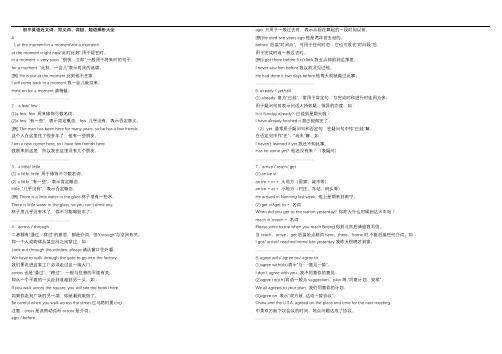
.初中英语近义词、同义词、词组、短语辨析大全A1.at the moment\in a moment\for a moment\at the moment=right now"此时此刻",用于现在时。
in a moment = very soon “很快,立即”,一般用于将来时的句子。
for a moment “此刻,一会儿”表示时间的延续。
[例] He is out at the moment.此刻他不在家。
I will come back in a moment.我一会儿就回来。
Hold on for a moment.请稍候。
.............................................................2.a few/ few(1)a few, few 用来修饰可数名词。
(2)a few “有一些”,表示肯定概念,few 几乎没有,表示否定意义。
[例] The man has been here for many years, so he has a few friends. 这个人在这里住了很多年了,他有一些朋友。
I am a new comer here, so I have few friends here.我刚来到这里,所以我在这里没有几个朋友。
.............................................................3.a little/ little(1) a little, little 用于修饰不可数名词。
(2) a little “有一些”,表示肯定概念。
little “几乎没有”,表示否定概念。
[例] There is a little water in the glass.杯子里有一些水。
There is little water in the glass, so you can’t drink any.杯子里几乎没有水了,你不可能喝到水了。
英语近义词辨析
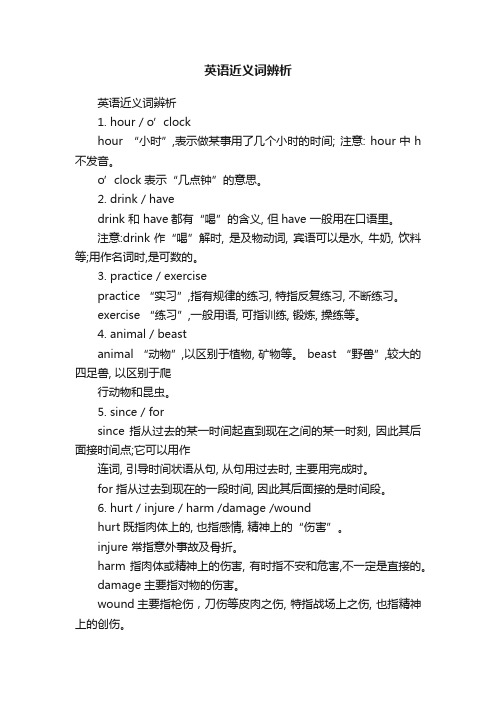
英语近义词辨析英语近义词辨析1. hour / o’clockhour “小时”,表示做某事用了几个小时的时间; 注意: hour中h 不发音。
o’clock表示“几点钟”的意思。
2. drink / havedrink 和 have都有“喝”的含义, 但have 一般用在口语里。
注意:drink作“喝”解时, 是及物动词, 宾语可以是水, 牛奶, 饮料等;用作名词时,是可数的。
3. practice / exercisepractice “实习”,指有规律的练习, 特指反复练习, 不断练习。
exercise “练习”,一般用语, 可指训练, 锻炼, 操练等。
4. animal / beastanimal “动物”,以区别于植物, 矿物等。
beast “野兽”,较大的四足兽, 以区别于爬行动物和昆虫。
5. since / forsince 指从过去的某一时间起直到现在之间的某一时刻, 因此其后面接时间点;它可以用作连词, 引导时间状语从句, 从句用过去时, 主要用完成时。
for 指从过去到现在的一段时间, 因此其后面接的是时间段。
6. hurt / injure / harm /damage /woundhurt既指肉体上的, 也指感情, 精神上的“伤害”。
injure 常指意外事故及骨折。
harm 指肉体或精神上的伤害, 有时指不安和危害,不一定是直接的。
damage主要指对物的伤害。
wound主要指枪伤,刀伤等皮肉之伤, 特指战场上之伤, 也指精神上的创伤。
7. appoint / assign / nameappoint “任命”,指不经选举, 由当权者经过仔细考虑以后作出委派, 分配。
assign “指派”,指分配, 分派工作。
name “任命”,指宣布任命。
注意family name是(英美人姓名中的)姓, first name (美国常作given name )是名字, 是出生时父母给取的。
初中英语近义词辨析中考复习

智胜科技初中英语近义词辨析中考复习1. clothes, cloth, clothingclothes 统指各种衣服,谓语动词永远是复数, cloth 指布,为不可数名词clothing 服装的总称,指一件衣服用 a piece of, an article of2.f amily, house, homehome 家,包括住处和家人, house 房子,住宅,family 家庭成员 . My family is a happy one.3.s ound, voice, noisesound 自然界各种各样的声音,voice 人的嗓音,noise 噪音I hate the loud noise outside.4.p hoto, picture, drawingphoto 用照相机拍摄的照片,picture 可指相片,图片,电影片,drawing 画的画 . 5.p opulation, peoplepopulation 人口,人数, people 具体的人China has a large population.6.r oad, street, path, wayroad 具体的公路,马路,street 街道,path 小路,小径, way 道路,途径take this road; in the street, show methe way to the museum.7.c ustom, habitcustom 传统风俗,习俗,也可指生活习惯,后接 to do , habit 生活习惯,习惯成自然,后接 of doing. I've got the habit of drinkinga lot.8.e xercise, exercises, practiceexercise 运动,锻炼(不可数),exercises 练习(可数), practice (反复做的)练习Practice makes perfect.9.c lass, lesson作"课"解时,两者可以替换.指课文用lesson. 指班级或全体学生用class. Lesson 6; class 5.10. officer, officialofficer 部队的军官, official 政府官员an army officer11. work, job二者均指工作。
九年级英语近义词辨析(全)
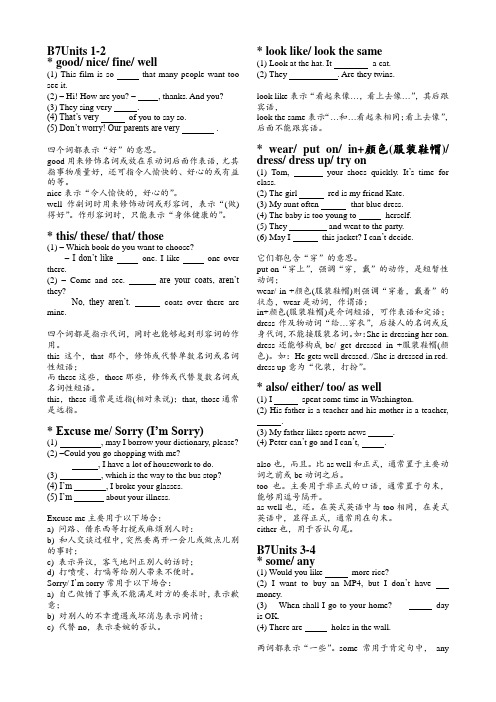
B7Units 1-2* good/ nice/ fine/ well(1) This film is so that many people want too see it.(2) – Hi! How are you? –, thanks. And you?(3) They sing very .(4) That’s very of you to say so.(5) Don’t worry! Our parents are very .四个词都表示“好”的意思。
good用来修饰名词或放在系动词后面作表语,尤其指事物质量好,还可指令人愉快的、好心的或有益的等。
nice表示“令人愉快的,好心的”。
well作副词时用来修饰动词或形容词,表示“(做)得好”。
作形容词时,只能表示“身体健康的”。
* this/ these/ that/ those(1) – Which book do you want to choose?–I don’t like one. I like one over there.(2) –Come and see. are your coats, aren’t they?- No, they aren’t. coats over there are mine.四个词都是指示代词,同时也能够起到形容词的作用。
this这个,that那个,修饰或代替单数名词或名词性短语;而these这些,those那些,修饰或代替复数名词或名词性短语。
this,these通常是近指(相对来说);that, those通常是远指。
* Excuse me/ Sorry (I’m Sorry)(1) , may I borrow your dictionary, please?(2) –Could you go shopping with me?-, I have a lot of housework to do.(3) , which is the way to the bus stop?(4) I’m , I broke your glasses.(5) I’m about your illness.Excuse me主要用于以下场合:a) 问路、借东西等打搅或麻烦别人时:b) 和人交谈过程中,突然要离开一会儿或做点儿别的事时;c) 表示异议,客气地纠正别人的话时;d) 打喷嚏、打嗝等给别人带来不便时。
初中英语近义词辨析大全共80页(超全)

初中英语近义词辨析大全1 a bit/ a little这两个词都意为“一点儿”有时可以互换,但有时不能。
Ⅰ.二者作程度副词修饰形容词、副词、动词或比较级时,意义相同,为“一点儿”“有些”。
如:①I am a bit / a little hungry. 我有点饿。
②He walked a bit / a little slowly. 他走路有点慢。
Ⅱ.二者都可以作名词词组,充当主语或宾语。
如:① A little / bit is enough for me. 我有一点儿就够了。
②I know only a little / a bit about her. 我对她的情况只了解一点。
Ⅲ。
a little可直接修饰名词;a bit后须加of才可以。
如:①.There is a little water in the bottle. = There is a bit of water in the bottle.[注意]a little of后的名词通常特指,表“……中的一些”,如:①May I have a little of your tea?Ⅳ. 否定形式not a little 作状语,相当于very/ quite, “很”,“非常”;作定语和宾语时,相当于much, 意为“许多”。
而not a bit 作状语时,相当于not at all, 意为“一点也不”,作宾语时则相当于not much. Eg:①He is not a little (=very) hungry. 他饿极了。
②He is not a bit (=not at all) hungry.他一点也不饿。
③She ate not a little (=much). 她吃得很多。
Ⅴ. Not a bit中的not 可以分开使用;not a littl e中的not 则不能分开。
Eg:①He felt not a bit tired. = He didn’t feel a bit tired. 他觉得一点也不累。
初中英语同义词辨析
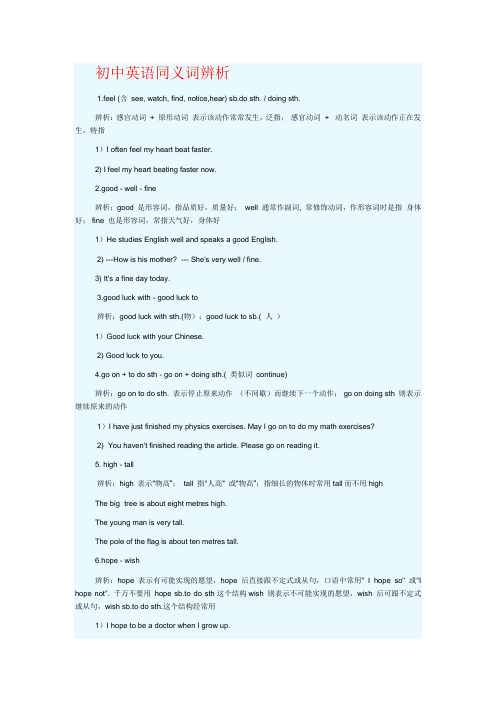
初中英语同义词辨析1.feel (含see, watch, find, notice,hear) sb.do sth. / doing sth.辨析:感官动词+ 原形动词表示该动作常常发生,泛指;感官动词+ 动名词表示该动作正在发生,特指1)I often feel my heart beat faster.2) I feel my heart beating faster now.2.good - well - fine辨析:good 是形容词,指品质好,质量好;well 通常作副词, 常修饰动词,作形容词时是指身体好; fine 也是形容词,常指天气好,身体好1)He studies English well and speaks a good English.2) ---How is his mother? --- She's very well / fine.3) It's a fine day today.3.good luck with - good luck to辨析:good luck with sth.(物);good luck to sb.( 人)1)Good luck with your Chinese.2) Good luck to you.4.go on + to do sth - go on + doing sth.( 类似词continue)辨析:go on to do sth. 表示停止原来动作(不间歇)而继续下一个动作; go on doing sth 则表示继续原来的动作1)I have just finished my physics exercises. May I go on to do my math exercises?2) You haven't finished reading the article. Please go on reading it.5. high - tall辨析:high 表示“物高”;tall 指"人高“ 或“物高”;指细长的物体时常用tall而不用highThe big tree is about eight metres high.The young man is very tall.The pole of the flag is about ten metres tall.6.hope - wish辨析:hope 表示有可能实现的愿望,hope 后直接跟不定式或从句,口语中常用" I hope so" 或"I hope not". 千万不要用hope sb.to do sth这个结构wish 则表示不可能实现的愿望,wish 后可跟不定式或从句,wish sb.to do sth.这个结构经常用1)I hope to be a doctor when I grow up.2) We hope that we all can pass the exam.3)-- Do you want to go with us? --- I hope so.4) He wishes he could fly to the moon some day.5) The teacher wished us to hand in our exercise-books in time.6.have to - must辨析:have to 表示客观需求,“必须”“一定”“不得不”,而must则表示主观愿望1)I had to stay at home to look after my mother because she is ill yesterday.2)He doesn't have to say so .3)You must learn English well.7. hanged - hung辨析:hanged 表示“绞死”“吊死”,hung 表示“悬挂”“吊起来”1)You will be hanged as a spy tommorrow.2) My wet clothes are hung on the line .8. have been - have gone辨析:have been表示“去过某地”,而have gone 则表示“到某地去了”,现不在这里1)I have been to Beijing twice already.2) My head teacher has gone to Nanjing.3) ---- Where is your father? --- He has gone to work.9. hear - listen - listen to辨析:hear 表示“听”的结果,listen to 表示“听”的动作,而listen 则是呼唤词,通常放到句首1)I listened to the teacher , but I heard nothing clearly.2) Please listen to her carefully.3) Listen! Who is crying?10.have/ have got(1)在英语口语中,常用have got 代替have ,作“有”解。
中考英语43组高频近义词辨析详解

中考英语43组高频近义词辨析详解1、近义词辨析:accept 和receiv eaccept 是“接受、认可“的意思,是收到并接受;receive 有”收到“的意思,但不一定接受。
e.g. I received a lot of gifts on my birthday, but I didn’t accept any.生日那天我收到许多礼物,但是我并没有收下任何礼物。
2、近义词辨析:ago 和beforeago: 应注意两点:1.用于一般过去时;2. 它所指的时间是从现在算起。
before: 也应该注意两点:1.用于过去完成时;2. 她所指的时间不是从现在算起,而是从过去某一时刻算起。
e.g. A short time before, tall trees had covered the country for many miles around. 在那时不久之前,高大的树木覆盖着方圆数英里。
3近义词辨析:agree to 和agree withagree to: 意思是“同意”,后面接表示计划、安排、意见、条件之类的名词或动词原形,表示愿意协助工作。
e.g. Do you agree to this agreement? 你同意这项协议吗?He didn’t agree to help us. 他不同意帮助我们。
agree with: 意思是“与……(意见)一致”后面一般接人,也可接意见、看法等。
但不含有协助的意思。
e.g. I don’t agree with what you sai d. 我不同意你说的话。
I don’t agree with your idea. 我不同意你的主意。
alone 指“独自一人胡”,强调客观事实,通常只放在动词、系动词之后,作表语。
e.g. He was alone in the room. 他独自一人在屋里。
lonely 指“孤单的”、“孤独的”,表示主观感觉,在句中作表语或定语。
初中英语183个同义词辨析详细解析
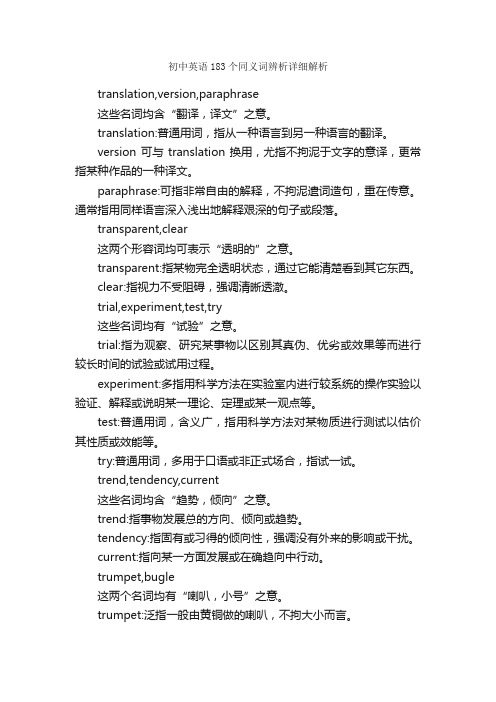
初中英语183个同义词辨析详细解析translation,version,paraphrase这些名词均含“翻译,译文”之意。
translation:普通用词,指从一种语言到另一种语言的翻译。
version可与translation换用,尤指不拘泥于文字的意译,更常指某种作品的一种译文。
paraphrase:可指非常自由的解释,不拘泥遣词造句,重在传意。
通常指用同样语言深入浅出地解释艰深的句子或段落。
transparent,clear这两个形容词均可表示“透明的”之意。
transparent:指某物完全透明状态,通过它能清楚看到其它东西。
clear:指视力不受阻碍,强调清晰透澈。
trial,experiment,test,try这些名词均有“试验”之意。
trial:指为观察、研究某事物以区别其真伪、优劣或效果等而进行较长时间的试验或试用过程。
experiment:多指用科学方法在实验室内进行较系统的操作实验以验证、解释或说明某一理论、定理或某一观点等。
test:普通用词,含义广,指用科学方法对某物质进行测试以估价其性质或效能等。
try:普通用词,多用于口语或非正式场合,指试一试。
trend,tendency,current这些名词均含“趋势,倾向”之意。
trend:指事物发展总的方向、倾向或趋势。
tendency:指固有或习得的倾向性,强调没有外来的影响或干扰。
current:指向某一方面发展或在确趋向中行动。
trumpet,bugle这两个名词均有“喇叭,小号”之意。
trumpet:泛指一般由黄铜做的喇叭,不拘大小而言。
bugle:一般指军队中吹信号用的小喇叭。
turbulent,stormy,violent,wild,fierce这些形容词均含“剧烈的,凶猛的,狂暴的”之意。
turbulent:正式用词,多用描写风和水,也可指心神不定或控制不住的感情波动。
stormy:指风雨大作,也指人很激动的感情。
初中三年英语必备同义词辨析(附超详细讲解例句)

初中三年英语必备同义词辨析(附超详细讲解例句)中考常考同义词辨析1.say, speak, talk, tell这四个词都有“说”的意思,其用法差异主要在于各自强调的对象、内容不同。
(1) say的意思是“说”、“讲”、“说出”,是及物动词,强调“说”的内容。
不仅可指口头“说”,而且可指书面“说”。
eg: ① He said nothing to me. 他对我什么也没说。
② He said in his letter that he was getting on well with his life.他在信中说,他生活得很好。
(2) speak表“说”、“讲”,它可以表示任何一种方式的“说话”。
它着重“说话”这一动作本身,而不强调所“说”的内容。
它通常为不及物动词,但它也可以作及物动词,后接the language、the truth、aword等,或接表示语言名称的名词。
eg: ①Please speak more slowly and clearly. 请说慢些和清楚些。
②Who is speaking? 你是谁?(打电话时用语)③Can you speak Japanese? 你会讲日语吗?(3) talk表示“交谈”、“谈话”,它指连贯地与人交谈,着重指说话的动作,而不强调说话的内容。
它一般用作不及物动词。
eg: ①What are you talking about? 你们在谈论什么?②We are talking about the Chinese footballmatch.我们在谈论中国足球比赛。
(4) tell表“告诉”、“讲述”之意,是及物动词,常强调所讲的内容,不表示动作。
重点句式:tell sb. sth = tell sth to sb. 告诉某人某事eg: He told me nothing. = He toldnothing to me.他什么也没告诉我。
tell sb. (not) to do sth. 告诉某人(不)去做某事eg: He told us not to worry abouthim.他告诉我们不要为他担心。
常见英文近义词辨析100组

常见英文近义词辨析100组1. accept vs. receiveAccept 暗示自愿接受,通常涉及主动选择。
Receive 则表示被动接受,无需选择或同意。
2. accessible vs. approachableAccessible 指容易获得或接近。
Approachable 指容易相处或交谈。
3. accomplish vs. achieveAccomplish 强调完成特定的任务或目标。
Achieve 则更广泛,表示达到一个更重大的目标或状态。
4. accurate vs. preciseAccurate 指信息准确无误,与事实一致。
Precise 指信息非常详细、精确,没有模糊或不确定性。
5. activity vs. actionActivity 指一般性的、持续的行动。
Action 指具体的、一次性的行为。
6. advice vs. counselAdvice 指针对特定情况或问题的建议。
Counsel 通常指更全面、更深入的指导和建议。
7. affect vs. effectAffect 作为动词,表示影响或改变。
Effect 作为名词,表示结果或后果。
8. agree vs. concurAgree 指双方就某件事达成一致意见。
Concur 表示同意或支持他人的意见或决定。
9. almost vs. nearlyAlmost 表示非常接近,但没有完全达到。
Nearly 也表示非常接近,但通常比 almost 更明确。
10. amazing vs. astonishingAmazing 表示令人印象深刻或惊奇。
Astonishing 表示令人震惊或难以置信。
11. appear vs. seemAppear 指表面上或明显的样子。
Seem 指主观印象或感觉。
12. appreciate vs. admireAppreciate 指对某事或某人的价值或品质表示赞赏。
Admire 指对某事或某人持有高度的尊敬或钦佩。
100个近义词单词辨析

1. abandon desert discard quitabandon: 放弃,丢弃,抛弃。
指因为外界的压力或影响完全放弃,因迫不得已而放弃,如: abandon obligation 放弃任务。
desert:抛弃,舍弃,指某人或某物在困境中“被抛弃”。
如: desert the baby after giving birth 生下婴儿后将其抛弃。
discard: 丢弃,抛弃(老朋友或旧物)。
如:discard one’s old friends 抛弃老朋友。
quit: 离开,退出,突然放弃。
指主动放弃或离开。
如: quit one’s job 辞职。
2. abolish cancel remove eliminateabolish:废除,强调对法律或旧习惯的废除。
如: abolish slavery 废除奴隶制。
cancel: 取消,强调对原定的会议、计划、安排等取消。
如: cancel the meeting 取消会议。
remove: 出去,撤去。
强调位置的移动或从远处消失。
如: remove the stain from clothes 清除衣服上的污渍。
eliminate: 除去,剔除,淘汰。
强调使彻底消失。
如: eliminate sb. From competition 把某人淘汰出局,eliminate poverty 消除贫困3. abuse curse condemn criticizeabuse:谩骂,辱骂;滥用,虐待。
指出口恶言骂人。
curse:诅咒,咒骂。
表示愤怒或嫉恨。
condemn: 谴责,强调由于不良行为或过失而受到强烈谴责。
用于正式、严肃的场合。
criticize: 批评某人,强调指出某人的错误或不足之处。
4. accelerate speed hasten quickenaccelerate: 加速,既可指使物体加快速度运动,也可指使事情进程加快。
如:accelerate the economic growth 加快经济增长的速度。
初中英语知识归纳近义词的用法和区别

初中英语知识归纳近义词的用法和区别近义词是指在词义上或者语法用法上有一定相似度的词语。
在学习英语时,了解近义词的用法和区别对于提高语言表达的准确性和丰富性非常重要。
本文将对初中英语知识中常见的近义词进行归纳总结,并详细探讨它们的用法和区别。
1. ask / inquire"ask" 和 "inquire" 都表示“询问”的意思,但在用法上略有区别。
"ask" 是常用词,可以用于正式和非正式场合,一般用于对他人提出问题或请求信息。
例如:- She asked me about my favorite movie.(她问起我最喜欢的电影。
)- Can I ask you a question?(我可以问你个问题吗?)"inquire" 则更加正式和严肃,一般用于正式或商务场合。
例如:- He inquired about the price of the car.(他询问了一下汽车的价格。
)- The police are inquiring into the matter.(警方正在调查这件事。
)总结:"ask" 是更常用的词,适用于各种场合;"inquire" 则更正式,适用于商务或正式场合。
2. buy / purchase"buy" 和 "purchase" 都表示“购买”的意思,可以互相替换使用。
但从程度上来说,"purchase" 更正式,常用于商务或正式文书中。
例如:- She bought a new dress at the mall.(她在商场买了一条新裙子。
)- We purchased some office supplies for the company.(我们为公司购买了一些办公用品。
)总结:"buy" 更常用,可以适用于日常口语和非正式场合;"purchase" 更正式,适用于商务或正式写作。
初中英语近义词、同义词、词组、短语辨析大全

初中英语近义词、同义词、词组、短语辨析大全A1。
at the moment\in a moment\for a moment\at the moment=right now”此时此刻”,用于现在时.in a moment = very soon “很快,立即",一般用于将来时的句子.for a moment “此刻,一会儿”表示时间的延续。
[例] He is out at the moment。
此刻他不在家.I will come back in a moment。
我一会儿就回来。
Hold on for a moment。
请稍候。
.。
.。
.。
.。
..。
.。
.。
.。
....。
.。
.。
.。
..。
..。
.。
2.a few/ few(1)a few, few 用来修饰可数名词.(2)a few “有一些”,表示肯定概念,few 几乎没有,表示否定意义。
[例] The man has been here for many years, so he has a few friends。
这个人在这里住了很多年了,他有一些朋友。
I am a new comer here, so I have few friends here.我刚来到这里,所以我在这里没有几个朋友. .。
.。
..。
.。
.。
..。
.....。
...。
.。
.。
.。
.。
.。
.。
. 3.a little/ little(1) a little, little 用于修饰不可数名词。
(2) a little “有一些”,表示肯定概念。
little “几乎没有”,表示否定概念。
[例] There is a little water in the glass。
杯子里有一些水。
There is little water in the glass, so you can’t drink any。
杯子里几乎没有水了,你不可能喝到水了. .。
.。
.。
..。
..。
- 1、下载文档前请自行甄别文档内容的完整性,平台不提供额外的编辑、内容补充、找答案等附加服务。
- 2、"仅部分预览"的文档,不可在线预览部分如存在完整性等问题,可反馈申请退款(可完整预览的文档不适用该条件!)。
- 3、如文档侵犯您的权益,请联系客服反馈,我们会尽快为您处理(人工客服工作时间:9:00-18:30)。
1 a bit/ a little这两个词都意为“一点儿”有时可以互换,但有时不能。
Ⅰ.二者作程度副词修饰形容词、副词、动词或比较级时,意义相同,为“一点儿”“有些”。
如:①I am a bit / a little hungry. 我有点饿。
②He walked a bit / a little slowly. 他走路有点慢。
Ⅱ.二者都可以作名词词组,充当主语或宾语。
如:① A little / bit is enough for me. 我有一点儿就够了。
②I know only a little / a bit about her. 我对她的情况只了解一点。
Ⅲ。
a little可直接修饰名词;a bit后须加of才可以。
如:①.There is a little water in the bottle. = There is a bit of water in the bottle.[注意]a little of后的名词通常特指,表“……中的一些”,如:①May I have a little of your tea?Ⅳ. 否定形式not a little 作状语,相当于very/ quite, “很”,“非常”;作定语和宾语时,相当于much, 意为“许多”。
而not a bit 作状语时,相当于not at all, 意为“一点也不”,作宾语时则相当于not much. Eg:①He is not a little (=very) hungry. 他饿极了。
②He is not a bit (=not at all) hungry.他一点也不饿。
③She ate not a little (=much). 她吃得很多。
Ⅴ. Not a bit中的not 可以分开使用;not a littl e中的not 则不能分开。
Eg:①He felt not a bit tired. = He didn’t feel a bit tired. 他觉得一点也不累。
②He felt not a little tired. 他觉得非常累。
但不能说:He didn’t fell a little tired.§2 a few/ few/ a little/ littleⅠ. a few和few修饰可数名词,a little和little修饰不可数名词;a few和a little表示肯定意义,few和little 表示否定意义,可受only修饰。
如:①Few people will agree to the plan because it’s too dangerous.②This text is easy to understand though there are a few new words in it.③T here is little water left in glass. Will you please give me some④Don’t worry, we have a little time left.⑤§3about/ onⅠ.about “关于”表示的内容较为普通或指人时用它。
侧重于叙事,多用于叙述个人经历和事迹,故事内容涉及一些较浅的问题。
是非正式用语。
Ⅱ.on “关于”侧重于论述政治理论,国际形势,学术报告等。
也就是说,当表示这本书,这篇文章或演说是严肃的或学术性的可供专门研究这一问题的人阅读时用。
eg:This is a text book on African history. 这是一本关于非州历史的教科书。
[注]:它们有时可通用。
§4above/over/on/uponⅠ. 方位介词,“在……之上”Ⅱ. above 着重指:在……上方,不一定含有垂直在上的意思。
反义词为:below.①The sun rose above the horizon. 太阳升到了地平线上。
②The aero plane flew above the clouds.飞机在云层上飞行。
Ⅲ.over 表盖在……上面,或铺在……上面。
此时不能用above.代替。
含有垂直在上的意思。
反义词为under.①Spread the tablecloth over the table.把桌布铺在桌子上。
Ⅳ. on 含有与表面相接触的意思。
①The book is on the desk.②There is an oil painting on the wall. 墙上有一幅油画。
Ⅴ.upon 也含有和表面相接触的意思。
与on没有多大的区别,但较正式,口语中较少用。
①He laid his hand upon the boy’s head. 他把手放在孩子的头上。
[注]up 与以上几个不同,它表示向上方或高处,含有由下而上,由低而高的意思。
常和表示运动的动词连用。
作副词时,表示在上方或高处。
①We run up a hill. 我们跑上山。
②The plane was high up in the air.飞机在高空中。
- 1 - 共80§5accident/incident “事故”Ⅰ. accident 可以表示事故,指不幸的意外事件。
也表偶然的事件。
①Twenty people were killed in the railway accident②He met with an accident.这完全是偶然的事。
Ⅱ. Incident 的意思是事件,尤指与较重大的事件相比,显得不重要的事件。
它还可以表引起国际争端或战争的事件。
①It is a quite common incident.这是很普通的事。
②The Lugouqiao incident accrued on July 7th, 1937. 芦沟桥事件发生于1937年7月7日。
§6accept/receiveⅠ. accept “接受”,表示其行为是由主观意愿决定的。
①I accepted it without question. 我毫无疑问地接受了它。
②We have accepted his proposal. 我已接受了他的建议。
Ⅱ. receive “接到、收到、受到”表示其行为与主观意愿无关。
如:①I received a letter from him. 我收到了他的来信。
②He received the present, but he did not accept. 他收到了礼物,但没有接受下来。
③He received a good education.他受到了良好的教育。
[注] 在表示接待、接见时,通常用receive, 而不用accept.如:We often receive foreign guests. 我们经常接待外宾。
§7 at hand/ in handⅠ. at hand“在手边;在附近;即将到来”如:①When he writes, he always keeps a dictionary at hand.他写东西时,手边总有一本字典。
②Spring is at hand.春天就要来了。
Ⅱ. in hand “在手中的;现有的”引申为:“在掌握中;在处理中”。
如:①I have 100 yuan in hand.我手头有100元钱。
②The police immediately had the situation in hand.警方立即控制了局势。
§8accurate/exact/correctⅠ. accurate “准确、精确”不仅表无错误,且表细心,谨慎地做到符合标准,符合事实或真象。
如:①Clocks in railway stations must be accurate. 火车站的钟必须准确。
②The figures are not accurate.这些数字不精确。
Ⅱ. exact “精确、确切”强调完全符合标准,符合事实或真象,丝毫没有差错。
它这三个中语意最强。
如:①His translation is exact to the letter. 他的翻译翻译确切。
②Your description is not very exact.你的描述不很确切。
Ⅲ.correct. “正确”指按照一定的标准或规则,而没有错误。
在这有一个词中,它的语意最弱。
①His answer is correct. 他的回答是正确的。
②The thing turned out to be correct.事情结果是对的。
§9ache/pain “痛”Ⅰ. ache 通常指一种持续的隐痛。
它可以与表身体某部分的词,组成复合词。
如:①Where is the ache? 哪里痛?②I have a head ache (stomachache, toothache atc).Ⅱ. pain是普通用语。
不含持续痛的意味,尤指一种突然的剧痛。
除指肉体上的外,还指精神的痛苦。
如:①I feel a great deal of pain.我感到非常痛。
②He cried with pain. 他痛得直叫。
③I have a pain in the arm. 我手臂痛。
④I have pains all over. 我浑身痛。
⑤It gave us much pain to learn of the sad news. 听到不幸的消息很悲痛。
§10across/through/ overⅠ. across “横过、穿过”,指从……的一边到另一边。
含义与on有关。
如:①I swam across the river. 我游过这条河(指从此岸到彼岸)②Let’s help push the cart across the bridge. 我们帮着把车子推过桥吧。
-- 2 -Ⅱ. through “穿过、通过”指穿过两边。
是从空间较狭窄的一头穿到另一头。
是从内部穿过,含义与in有关。
如:①We walked through the forest. 我们穿过森林。
②The river flows through the city from west to east. 这条河从西到东流过城市。
Ⅲ. over“横过、跨越”指横过道路、河流等“细长物”时,与across通用。
Over 虽可指从表面的接触及跳(飞)越,但指渡过则不能用。
从房间、原野、海洋等“平面延伸”的一端横越到另一端时也不能使用。
而常用across.①She went across / over the bridge.②He jumped across / over the stream他跳过了小溪。
